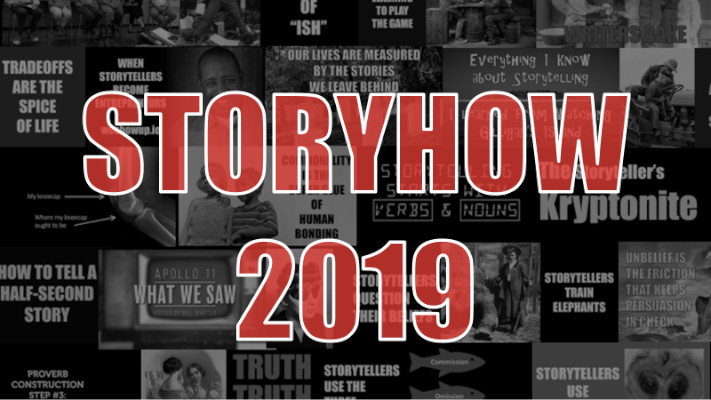
Our goal at the StoryHow Institute is to be your one-stop resource to help you become a better communicator. We fulfilled our promise in 2019 through publishing 22 articles with much more planned for 2020. Next month, Ron will be releasing a new deck of cards called the Proverb Construction KitTM (finally!). He’s researching two new books and is writing a specialized version of the StoryHow PitchDeckTM.
We look forward to serving your storytelling needs in the new decade.
Here’s a recap of StoryHow in 2019:
1. Proverb Construction Step #3: The Finish
This final post in a three-part series helps put the finishing touches on your self-created proverbs.
2. Storytelling Lessons from the Game: Two Truths and a Lie
The Icebreaker, Two Truths and a Lie, teaches great lessons in storytelling.
3. Storytellers use the Three Red Herrings
Storytellers are experts in ethical deception.
Apophenia, the human’s propensity to see patterns where none exist, is a powerful tool for your storytelling toolbox.
5. How to tell a story in a half-second
It’s called the startle response, the most basic human response to unfamiliar stimuli. Not only does it form the basis of all human understanding, but it forms the roots of storytelling
6. Commonality is the Super Glue of Human Bonding
Ron looks in to why finding something in common with a total stranger is the quickest way to bond.
7. The Storyteller’s Kryptonite
New study reveals that ad hominem attacks are the kryptonite of human communications
8. Unbelief is the Friction that Keeps Persuasion in Check
Although naysayers can blow up an argument through simple character assassinations, chief negotiator Chris Voss offers an antidote.
9. Storytelling Starts with Verbs and Nouns
Ron finds storytelling advice from one of the oddest places, the design engineers on the Apollo space program.
10. Storytellers Train Elephants
Before you step into the three ring circus of storytelling, you might want to brush up on your elephant training skills.
11. Who Knew Storytelling Could Be so Dangerous
Ron goes back to his storytelling roots with the release of his latest podcast episode on Griddlecakes Radio.
12. Storytellers Question Their Beliefs
If you still believe something after five years, question it. You’ll either learn something new about it, or change the view entirely. Both are good for storytellers.
13. Storytelling at its Finest, Apollo 11: What We Saw
Sometimes the best way to learn storytelling is to study the works of others. Ron goes card-by-card through the StoryHow(TM) PitchDeck to see how Bill Whittle used Roles, Events, Influences, and Techniques in his storytelling masterpiece, Apollo 11: What We Saw.
14. When Storytellers Become Entrepreneurs: weshowup.io
Storytellers bring new perspectives to the great game of business. Kahlil Ashanti is changing the way tickets are priced with his company, weshowup.
15. Our Lives Are Measured by the Stories We Leave Behind
Life is a great story, with plots, subplots, twists and turns. The best ones set themselves deeply into our memories. What are your favorite ones?
16. Tradeoffs are the Spice of Life
While marketers want to tell ideal stories, more often than not, their customers choices are less than ideal.
17. Why AI Scientists Must Study Storytelling
While deep neural networks can perform amazing functions, artificial intelligence has a long way to go to match the robustness of human intelligence. Ron Ploof, suggests that the path to achieve such robustness is found through storytelling.
18. Everything I know about Storytelling I learned from Gilligan’s Island
How do you create a great story that connects across generations? By studying a successful one. Ron analyzes the television show, Gilligan’s Island, using the StoryHow™PitchDeck.
19. Golden Nuggets from UCI’s Center for Storytelling
UCI School of the Humanities introduced its Center for Storytelling through an inaugural event called, Telling Stories that Matter. Here are some notes from that event.
An insidious trend that creeps under the auspices of protection is threatening human communication. But what exactly is it protecting us from?
21. Fool Me Once: Learning to Play the Game
Have you ever been taken advantage of? Have you ever been cheated, lied to, or deceived? At some point in our lives, someone uses our trust against us and we’re disappointed, hurt, and left somewhat jaded. Ron returns to his audio storytelling roots tell the story of being scammed and the lessons that he’s learned through the experiences
22. Storytellers Cook. Writers Bake.
It’s common to think of storytelling and writing to be interchangeable. They’re not. Ron examines the fundamental differences between writers and storytellers.